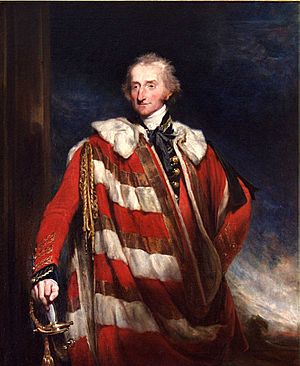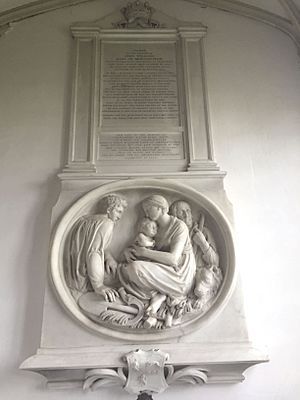John Egerton, 7th Earl of Bridgewater facts for kids
Quick facts for kids
The Earl of Bridgewater
|
|
|---|---|

The Earl of Bridgewater
|
|
| Member of Parliament for Brackley |
|
| In office 1780–1803 |
|
| Preceded by | William Egerton |
| Succeeded by | Anthony Henderson |
| Member of Parliament for Morpeth |
|
| In office 1777–1780 |
|
| Preceded by | Gilbert Elliot |
| Succeeded by | Anthony Morris Storer |
| Personal details | |
| Born | 14 April 1753 |
| Died | 21 October 1823 |
| Nationality | British |
| Political party | Tory |
| Spouse | Charlotte Haynes |
| Parents | John Egerton Anne Grey |
| Occupation | Cavalry officer |
John William Egerton, 7th Earl of Bridgewater (born April 14, 1753 – died October 21, 1823) was an important British figure. He was a brave cavalry officer in the army and a Tory politician. He was known as John Egerton until 1803. That year, he became the Earl of Bridgewater, a special noble title. He was also a Fellow of the Royal Society (FRS), which means he was recognized for his contributions to science.
Contents
About John William Egerton
John William Egerton came from the well-known Egerton family. His father was John Egerton, who was a Bishop. His grandfather, Henry Egerton, was also a Bishop. This shows he came from a family with important roles.
His Military Career
John Egerton joined the British Army in 1771. He moved up the ranks quickly.
- In 1776, he became a captain.
- In 1779, he was promoted to major.
- By 1790, he became a lieutenant-colonel.
He continued to rise in the army. In 1793, he became a colonel of the 7th Light Dragoons. Later, he led the 14th Light Dragoons. He served with distinction during the Peninsular War, a big conflict in Europe. He stayed as colonel of the 14th Dragoons for the rest of his life. He also earned higher general ranks:
- Major-general in 1795
- Lieutenant-general in 1802
- Full General in 1812
His Political Life
Besides his army career, Egerton was also a politician. He was a Tory and served as a Member of Parliament (MP). This meant he helped make laws for the country.
- He represented Morpeth from 1777 to 1780.
- He represented Brackley from 1780 to 1803.
In 1803, a relative named Francis Egerton, 3rd Duke of Bridgewater passed away. John William Egerton then inherited the noble title of the seventh Earl of Bridgewater. This meant he moved from the House of Commons to the House of Lords.
Other Achievements
John Egerton was also interested in learning and history.
- In 1808, he was chosen as a Fellow of the Royal Society. This is a very old and respected group for scientists.
- He also became a Fellow of the Society of Antiquaries in 1808. This group focuses on studying history and old things.
Later Years and Family
Lord Bridgewater passed away in October 1823 when he was 70 years old. He had married Charlotte Catherine Anne in 1783. They did not have any children. Because of this, his younger brother, Francis, inherited the title of Earl of Bridgewater after him.
John Egerton owned many large estates (lands and properties) across England. He wanted to leave these estates to a relative named John, Viscount Alford. However, there were special conditions in his will. These conditions led to a long legal battle after his death. In the end, the Egerton family lost control of these estates in 1851.
Monuments and Memorials
You can find a memorial for Lord Bridgewater at the Bridgewater Chapel. This chapel is located inside St. Peter and St. Paul Church in Little Gaddesden.
Centuries ago, in the early 1600s, another family member named Thomas Egerton, 1st Viscount Brackley, bought a very large house called Ashridge House. This house was one of the biggest country homes in England. The Egerton family lived there for many years. They also had a special family chapel and burial place at Little Gaddesden Church. Many memorials there honor the Dukes and Earls of Bridgewater and their families.
 | Tommie Smith |
 | Simone Manuel |
 | Shani Davis |
 | Simone Biles |
 | Alice Coachman |


